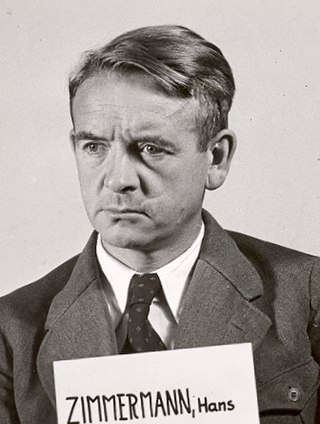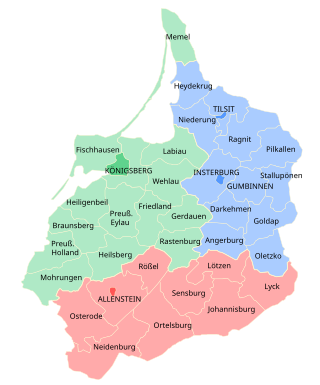
The Frontier March of Posen–West Prussia was a province of Prussia from 1920/1922 to 1938, covering most of lands of historical Greater Poland that were not included in the Second Polish Republic. Posen–West Prussia was established in 1922 as a province of the Free State of Prussia within Weimar Germany, formed from merging three remaining non-contiguous territories of Posen and West Prussia, which had lost the majority of their territory to the Second Polish Republic following the Greater Poland Uprising. From 1934, Posen–West Prussia was de facto ruled by Brandenburg until it was dissolved by Nazi Germany, effective 1 October 1938 and its territory divided between the provinces of Pomerania, Brandenburg and Silesia. Schneidemühl was the provincial capital. Today, lands of the province are entirely contained within Poland.

The Nazi Party/Foreign Organization was a branch of the Nazi Party and the 43rd and only non-territorial Gau ("region") of the Party. In German, the organization is referred to as NSDAP/AO, "AO" being the abbreviation of the German compound word Auslands-Organisation. Although Auslands-Organisation would be correctly written as one word, the Nazis chose an obsolete spelling with a hyphen.

Karl Holz was a German Nazi Party politician. He was Gauleiter of Gau Franconia and rose to the rank of Gruppenführer in the Sturmabteilung (SA).

Toszek is a small town in southern Poland. It is situated within Gliwice County in the Silesian Voivodeship (province), and its population was estimated at 3,600 inhabitants in 2019. It is situated on the Toszecki Potok River, a tributary of Kłodnica.

Gau Swabia, formed on 1 October 1928, was an administrative division of Nazi Germany in Swabia, Bavaria, from 1933 to 1945. From 1928 to 1933, it was the regional subdivision of the Nazi Party in that area.

Jakob Sporrenberg was an SS-Gruppenführer und Generalleutnant der Polizei in Minsk, Belarus and Lublin, Poland. After the war, Sporrenberg stood trial in Poland and was convicted in 1950 of war crimes and sentenced to death. He was executed in December 1952.
Gerhard Schach was a German politician, who was a member of the Preußischer Landtag and the Reichstag. He was present in the Berlin Führerbunker during the last days of Adolf Hitler in April 1945.

The Memorial to the Murdered Members of the Reichstag is a memorial in Berlin, Germany. The memorial is located in front of the Reichstag building and commemorates the 96 members of the parliament who died unnaturally between 1933 and 1945 (1948). The idea of creating the monument started in the 1980s, and the memorial was erected in September 1992. It was designed by Dieter Appelt, Klaus W. Eisenlohr, Justus Müller, and Christian Zwirner. The memorial is made of 96 cast iron plates, with the names, birth and death dates and places engraved on the edges. It has been designed so that it can be extended if new names are discovered in the future.
Philipp Wurzbacher was a German Sturmabteilung (SA) official and NSDAP member of the Reichstag from March 1933 until 1945. After the war, he remained imprisoned in labour camps until 1953.

Hans Zimmermann was a German Nazi Party official. He served as the Acting Gauleiter of Gau Franconia between February 1940 and April 1942.
Philipp Meyer was a German politician who held the position of a Kreisleiter in the Nazi Party from 1932 to 1945. He was sentenced to death at end of the Second World War for refusing to evacuate his district and prepare it for defense, but was spared. In post-war West Germany he was a member of the Bundestag, the federal parliament, from 1953 until his death.

Christian Hartmann is a German historian. He is a research fellow at the Institute of Contemporary History in Munich.
Julius Adler was a German politician and member of the Communist Party of Germany. A member of the Reichstag from 1928 to 1933, he was later detained by the Gestapo and died in the Bergen-Belsen concentration camp.
Moritz Baerwald was a German lawyer and politician of the German Democratic Party, a member of the Prussian House of Representatives and the Weimar National Assembly.
Walter Arthur Reek, was a social democrat politician in Germany and the Free City of Danzig. He was a member of the Weimar National Assembly, the Danzig Volkstag parliament and mayor of Neuteich.
August Grunau was a German politician and Unionist, he was a member of the Weimar National Assembly representing the Catholic Centre Party.

The Goldap district was a Prussian district in East Prussia that existed from 1818 to 1945. Its territory is now divided between the Polish Warmian-Masurian Voivodeship and the Russian Kaliningrad Oblast.

Wilhelm Heinrich Börger was a German Nazi Party functionary and SS-Brigadeführer. He held several administrative positions, including as a Trustee of Labour and a Ministerial Director in the Reich Ministry of Labor. He also sat as a member of the Reichstag and the Prussian State Council. Following the defeat of Nazi Germany in the Second World War, he was interned for three years and released.
Hermann Richard Paul Czirniok was a politician and a member of the National Socialist German Workers' Party in the Nazi Germany. From 1932 to 1933 he was a member of the Landtag of Prussia, and in 1934, a mayor of Szczecin.
Hellmuth Becker was a German Nazi politician. He was a member of the Hamburg Parliament from 1932 to 1933 and from 1933 to 1945 he was active in the National Socialist German Reichstag and in Hamburg's Nazi cultural policy.










